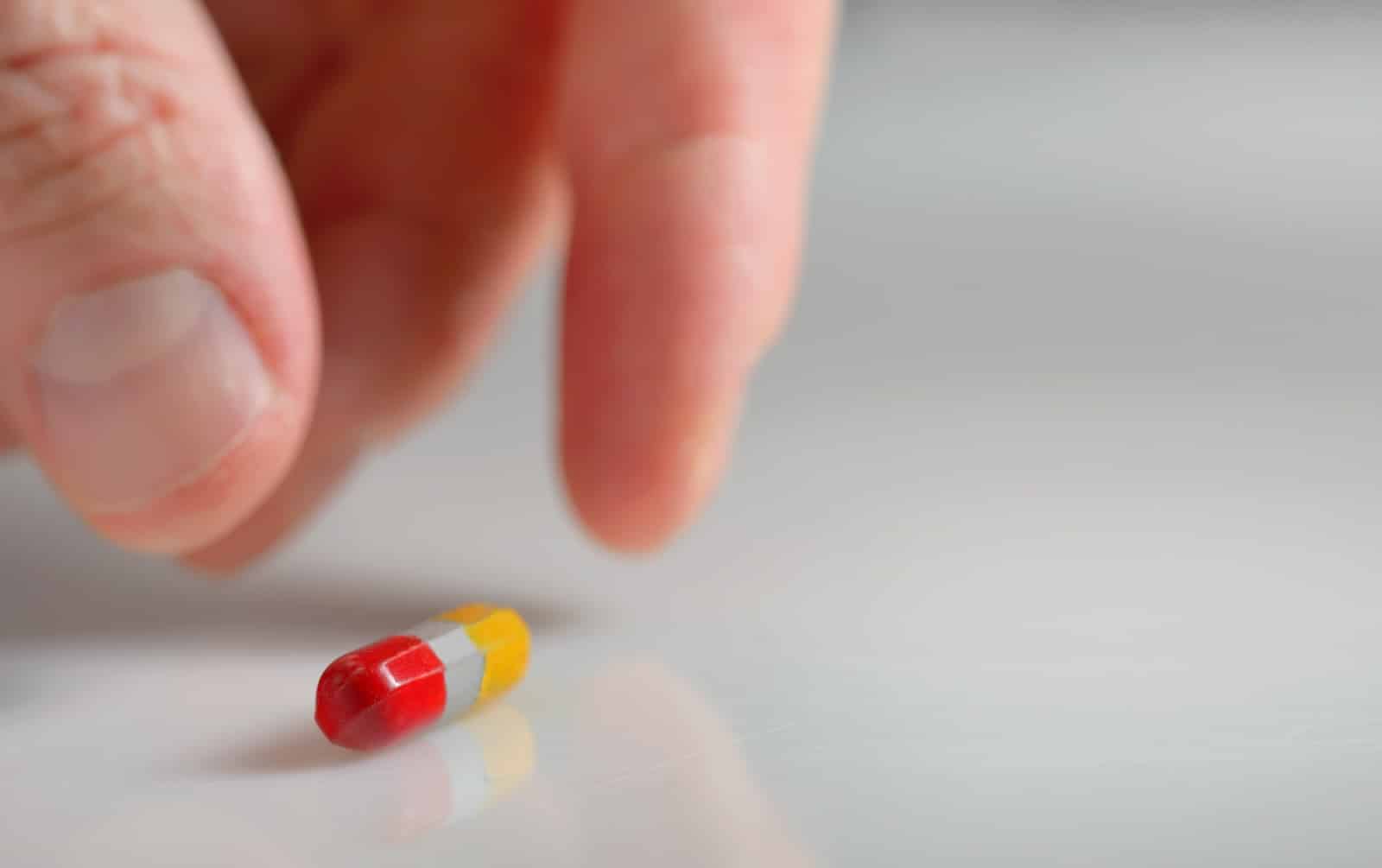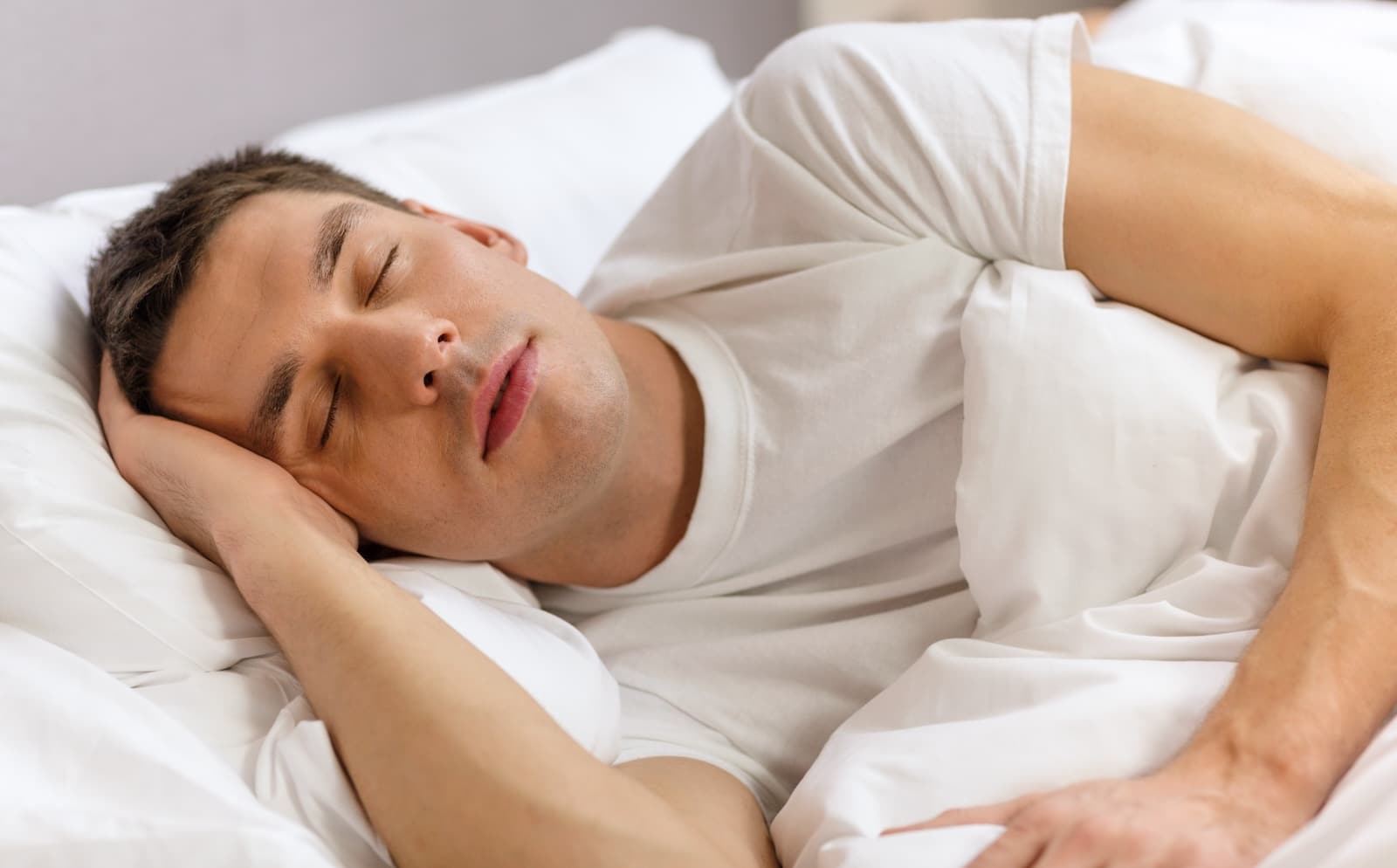Substances
Over-the-Counter Alternatives to Ambien: Effective Options for Insomnia
Medically Reviewed By
Written By
Last medically reviewed April 21, 2025
Substances
Medically Reviewed By
Written By
Last medically reviewed April 21, 2025

About 40% of American adults experience insomnia.[1] For many, lifestyle changes and therapy aren’t enough to help, leading them to turn to sleep medication. While medications like Ambien can be effective, they also come with significant risks.
There are over-the-counter alternatives to Ambien that may be effective and safer, but there are risks and side effects to be aware of. Here’s what you need to know if considering alternatives to Ambien.
Ambien is the brand name for zolpidem, a nonbenzodiazepine hypnotic medication that’s FDA-approved for the short-term treatment of insomnia characterized by difficulties falling asleep. The drug promotes sleep by affecting the activity of a neurotransmitter in the brain called gamma-aminobutyric acid (GABA), causing a sedative effect that can help you fall asleep more quickly.
Ambien comes in a standard and an extended-release version, Ambien CR, and as generic zolpidem in both immediate-release and extended-release.
Though Ambien is often prescribed for insomnia, it’s not without side effects and risks. Some common side effects include daytime drowsiness, dizziness, weakness, lightheadedness, tired feeling, loss of coordination, stuffy nose, dry mouth, nose or throat irritation, diarrhea, upset stomach, constipation, headache, and muscle pain.[2]
There are serious side effects that may occur with Ambien, including allergic reactions, anxiety, depression, agitation, confusion, unusual thoughts, hallucinations, memory problems, changes in personality, and thoughts of suicide or self-harm.[3] In addition, some people experience complex sleep behaviors while taking Ambien, such as sleepwalking, sleep driving, and next-day drowsiness that can make it difficult to function normally.
Ambien may not be suitable for people with certain medical conditions, such as severe liver impairment and respiratory depression. It also has a potential for dependence and withdrawal, so it’s not an ideal choice if you have a history of substance misuse. As a result, some people are better off seeking alternatives.
There are plenty of prescription sleep aids that may be suitable alternatives to Ambien, but many have serious risks and side effects – including a high risk of addiction. If you want nonprescription alternatives to Ambien, here are some options:
Antihistamines are commonly used to relieve allergy symptoms, but they can cause drowsiness. They affect histamine levels, a neurotransmitter that plays a role in wakefulness and promotes drowsiness and sleep. Diphenhydramine and doxylamine are two common antihistamines found in sleep aids.
Diphenhydramine is an antihistamine commonly found in over-the-counter sleep aids.[4] It affects histamine levels in the brain, causing sedation and drowsiness. Doxylamine is another antihistamine often used in sleep aids because of its soothing effects.[5]
Antihistamines are not safe for long-term use, as the body can develop a tolerance. This makes the drug less effective, meaning you need more for the same effects. Side effects include drowsiness, dry mouth, constipation, blurred vision, and potential morning grogginess.[6] It may confuse some people, particularly older adults.
Cannabidiol (CBD) is a compound derived from the cannabis plant. It can promote relaxation and improve sleep quality for people who use it. It interacts with the endocannabinoid system in the body, which regulates various psychological processes, including sleep. CBD is not the psychoactive compound in cannabis.
While CBD may be effective in treating insomnia, the effects can vary based on dose and formulation. CBD may interact with certain medications and affect liver enzymes. Dry mouth, dizziness, drowsiness, fatigue, and, in some cases, changes in appetite or mood are possible side effects.[7]
Melatonin is a hormone that regulates sleep-wake cycles. It is commonly used as a natural remedy for insomnia because it promotes relaxation and sleep. Research suggests that melatonin supplements can help sleep quality and reduce the time it takes to fall asleep.[8] It may be especially helpful for sleep disorders caused by disruptions in the body’s natural sleep-wake cycle (circadian rhythm), such as jet lag.
Though melatonin is generally considered safe for short-term use, little research has been done into its long-term effects. Too much melatonin can disrupt the natural hormone balance, worsening sleep issues. Melatonin has some similar side effects to Ambien, including drowsiness, headache, and dizziness, as well as possible hormonal effects with high doses or long-term use.[9] Some people experience vivid dreams or nightmares.

Valerian root has been used for centuries to treat sleep problems. It’s believed to work by increasing levels of GABA that help regulate sleep. Valerian root may help improve sleep quality and reduce the time it takes to fall asleep, making it a potential alternative to Ambien.
Valerian root is generally safe in the short term, but long-term safety is limited. People who are pregnant or have liver problems shouldn’t take valerian root. Some of the side effects include drowsiness, headache, dizziness, stomach upset, and vivid dreams.[10] Some people experience next-day drowsiness.
Kava is derived from the shrub Piper methysticum, known for its sedative and muscle-relaxant properties. It acts on GABA and benzodiazepine-binding sites, potentially helping with anxiety and stress, which are common contributors to insomnia.
Long-term use of kava has been linked to liver damage. It also has a risk of side effects, including dry, scaly skin, apathy, mood swings, malnutrition, weight loss, shortness of breath, and infections.[11]
L-theanine is an amino acid found in tea leaves that has been studied for its potential sleep-promoting effects. It induces relaxation without causing drowsiness and may help improve sleep quality and reduce anxiety, making it a possible alternative to Ambien.
L-theanine can be safe when used within recommended amounts, but the effectiveness of sleep may vary. Some people experience rare side effects like dizziness or headaches.[12]
In addition to individual risks, dietary supplements like vitamins and herbs are not regulated by the FDA in the same way as medications. These supplements don’t undergo extensive clinical trials to determine their safety and efficacy, so talk to your doctor about the possible side effects and risks.
Medication can help with insomnia, but it’s not the only option. Therapy and lifestyle modifications are an important part of the treatment plan, with or without medication, for a holistic approach to the root causes and symptoms of insomnia.
For many people, underlying psychological and lifestyle factors contribute to sleep disturbances. Addressing these issues can help you achieve more sustainable and long-term improvements in sleep quality and overall mental health.
Cognitive behavioral therapy for insomnia can effectively change the thoughts and behaviors that disrupt sleep. This includes techniques like stimulus control and sleep restriction, effectively reducing insomnia symptoms. Mindfulness and meditation, which focus on being fully present and engaged at the moment, can reduce stress levels and improve sleep quality.
Therapy isn’t a one-size-fits-all solution, however. Treatment is individualized and should include some lifestyle changes, such as:
Ambien is often used to treat insomnia, but there are plenty of other options to consider. Over-the-counter alternatives to Ambien may help with sleep with fewer side effects and risks, but they’re not harmless, either. Talk to your doctor about OTC alternatives to Ambien and therapy options to help you get more restful sleep.
Natural herbs and over-the-counter alternatives to Ambien, such as melatonin and valerian root, may be effective in improving sleep quality and duration for people struggling with insomnia. However, these alternatives are not without risks, including some serious risks like dependence and liver damage.
OTC alternatives to Ambien have shown limited effectiveness in treating insomnia. In one randomized, double-blind crossover study, the tolerance to diphenhydramine’s sedative effect was complete within three days of administration.[13]
The closest over-the-counter option to Ambien is antihistamines that cause drowsiness, such as diphenhydramine, found in Benadryl and Sominex, or doxylamine, found in brand names like Unisom.
[1] Stephanie Reese, D. (2022, April 7). What is insomnia? causes, symptoms, types, and treatment. GoodRx. Retrieved from https://www.goodrx.com/conditions/insomnia on 2024, November 9.
[2,3] Ambien uses, dosage, side effects & warnings. Drugs.com. (n.d.-a). Retrieved from https://www.drugs.com/ambien.html on 2024, November 9.
[4] Diphenhydramine uses, dosage & side effects. Drugs.com. (n.d.-e). Retrieved from https://www.drugs.com/diphenhydramine.html on 2024, November 9.
[5] Doxylamine uses, Side Effects & Warnings. Drugs.com. (n.d.-j). Retrieved from https://www.drugs.com/mtm/doxylamine.html on 2024, November 9.
[6] List of common antihistamines + uses & side effects. Drugs.com. (n.d.-i). https://www.drugs.com/drug-class/antihistamines.html
[7] Cannabidiol. Drugs.com. (n.d.-d). Retrieved from https://www.drugs.com/cannabidiol.html on 2024, November 9.
[8] Lie, J. D., Tu, K. N., Shen, D. D., & Wong, B. M. (2015, November). Pharmacological treatment of insomnia. P & T : a peer-reviewed journal for formulary management. Retrieved from https://pmc.ncbi.nlm.nih.gov/articles/PMC4634348/ on 2024, November 9.
[9] Melatonin: Uses, side effects, dosage (kids/adults). Drugs.com. (n.d.-q). Retrieved from https://www.drugs.com/melatonin.html on 2024, November 9.
[10] Valerian uses, side effects & warnings. Drugs.com. (n.d.-s). Retrieved from https://www.drugs.com/mtm/valerian.html on 2024, November 9.
[11] Kava uses, side effects & warnings. Drugs.com. (n.d.-q). Retrieved from https://www.drugs.com/mtm/kava.html on 2024, November 9.
[12] Cleveland Clinic. (2024a, July 2). Here’s what you need to know about L-theanine. https://health.clevelandclinic.org/l-theanine
[13] Lie, J. D., Tu, K. N., Shen, D. D., & Wong, B. M. (2015, November). Pharmacological treatment of insomnia. P & T : a peer-reviewed journal for formulary management. Retrieved from https://pmc.ncbi.nlm.nih.gov/articles/PMC4634348/ on 2024, November 9.